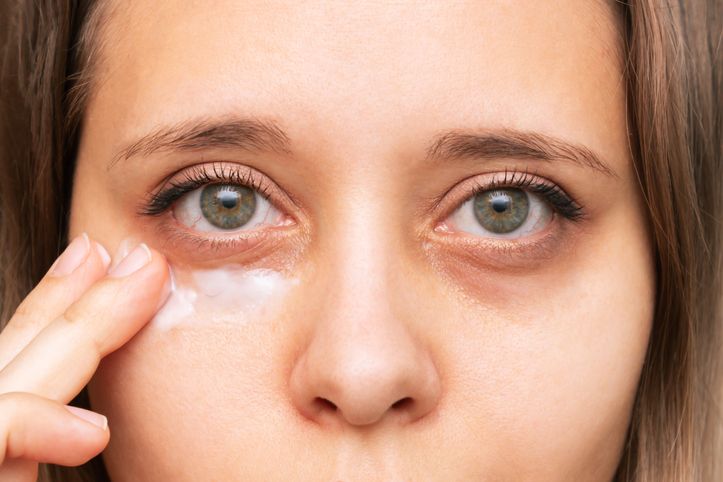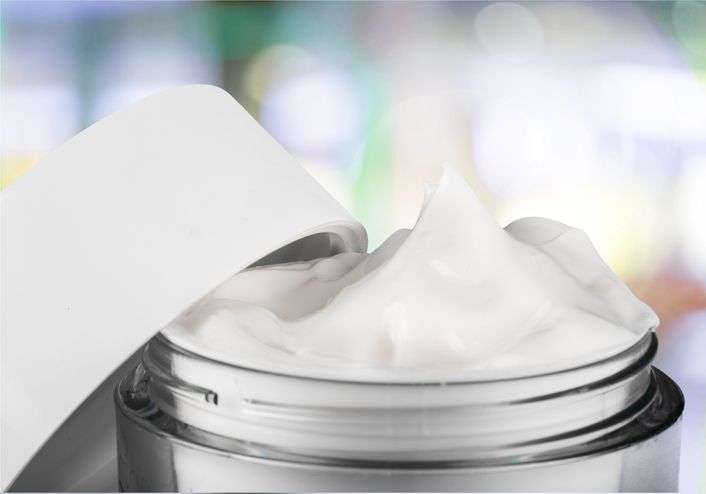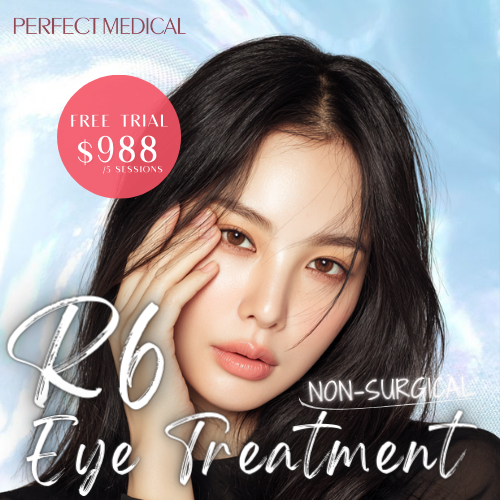
- Home
- Trend
- Weight Loss Strategies
- Acne Tips
- Hair Health Information
- Blemish Removal Tips
- Acne Scar Removal Tips
- Muscle Building Techniques
- Intimate Care Tips
- Postpartum Intimate Care
- Eye Bags Wiki
- Tips for Face Slimming
- Secret of Permanent Hair Removal
- Breast Enlargement Tips
- Cure to Snoring
- Marionette Lines
- Skin-Tightening Secrets

免費體驗
R6 Miracle Eye Rescue Treatment
1 Minute Self-Registration
Date should not be before minimal date
Got fine lines creeping around your eye corners? Puffy eyes even with a full night's sleep? Saggy eye bags that you can't hide? Visible dark circles no matter how much concealer you use? Condolences to your skin: it is getting old. Skin ageing is inevitable, and the skin around the eyes often takes the biggest hit. Wrinkles, fine lines, dark circles and eye bags are nightmares you can't wake up from. Fear not! The skincare market is full of eye creams and eye serums. Numerous of them claim to prevent and even reduce ageing signs. How to pick the ones that truly work, you ask? Here you will learn the differences between eye creams and moisturisers. You will also get an ultimate guideline on the top anti-aging ingredients you must look for in eye creams, scientist-approved!
1
What are the benefits of using eye cream?

As you age, you will notice your skin getting drier and less bouncy—this is due to the gradual loss of collagen and elastin. Collagen and elastin compose dermis, a deep skin layer, which holds hydration, reflects light and maintains the skin's elasticity. These functions work together to keep your skin hydrated, bright, bouncy and firm.
The natural ageing process and other factors (i.e. sun rays, pollution, poor sleeping schedule, mental stress, poor diets) can break down collagen and elastin. The gradually slowed down both the metabolism and collagen production, making for dry, dull, saggy skin.
Your eye areas have one of the thinnest and the most delicate skin areas of your entire body. This is because the collagen layer underneath is very thin, making for less elasticity. The eye areas also have very few oil glands, meaning less lubricant for the skin surface.
As a result, your eye area skin will be the most vulnerable to ageing signs such as dryness, wrinkles, fine lines, puffiness, saggy eye bags and dark circles.

2
Is eye cream necessary?

"Eye cream is just a more expensive version of face cream! I will just lather my favourite face cream around my eyes!"—If this is what you are thinking, you are in for a surprise!
Yes, while eye cream, just like face cream and gel, hydrates and moisturises your skin as well as gives specific effects such as brightening, firming and anti-aging, the formula of eye creams are designed to be gentle, non-suffocating yet potent.
A heavier face cream can suffocate your eye area skin, clogging the pores and resulting in milia. A lighter face gel is neither moisturising nor potent enough to achieve eye-area specific anti-aging effects.
Face serum and essences often contain a higher concentration of skincare ingredients, targeting specific concerns such as dark spots, dull skin tones and large pores. These products can be too harsh for the delicate skin around the eyes, often causing irritation.
The texture, hydration level, and ingredient concentration of an eye cream are adjusted to cater to the needs of your eye areas. A good eye cream moisturises and plumps your skin, effectively delivering skincare ingredients to the innermost skin layers.
In fact, using good-quality eye creams starting from your 20s can protect you from ageing signs in the long-term. So the prices of eye creams are definitely worth it!
- Uneven Eyes: What Causes Asymmetrical Eyes And 4 Ways To Fix Them Naturally
- Got Puffy Eyes? Our Editor Tests 3 Daily TCM Remedies For Eye Bags, 2 Powerful Diet Tips & Acupressure Tricks You Need To Know!
- How to Remove Crow’s Feet? Experts Reveal 5 Proven Anti-Wrinkle Tips + 3 High-Performance Eye Cream Ingredients! 7 Best-Selling Eye Wrinkle Products Recommended!
- Concealer For Dark Circle: Into the Hyped World of Under Eye Concealers
3
What ingredients should I look for in eye creams?

Now that you understand eye cream is a must, you must be eager to search for one. However, not all eye creams labelled "anti-aging" contain active ingredients that actually target skin ageing signs. Here are 9 quintessential, test-and-proven anti-aging ingredients you must look for in your eye cream. You should also take note of whether these ingredients clash with the others.
1. Retinol
Retinol eye cream has been the biggest skincare hype for years. Retinol is praised for its benefits in improving common signs of ageing. Specifically, retinol can smoothen mature skin texture, commonly known as wrinkles, fine lines and sagging eye area skin.
How does retinol improve wrinkled skin? Well, while retinol is not an exfoliant, it gives exfoliation-like results: it encourages cellular cycle, speeding up old and dead skin cell shedding, stimulating collagen production, giving you younger, smoother under-eye skin!
But beware! Retinol is also known to cause irritations across all skin types. Common symptoms of irritation include skin dryness, redness and peeling. The peeling skin will become flaky and itchy, making the skin around the eyes tender and painful.
Therefore, you should start with the lower-concentration (0.25 to 0.5%) retinol eye creams if you are a beginner to retinol or have sensitive skin. As a rule of thumb, you shouldn’t put products with more than 1% retinol concentration onto the delicate under-eye skin.
Also, you shouldn't wear retinol in the daytime, as retinol is photosensitive, which can give your skin irritation symptoms.
Don't mix with: Vitamin C, caffeine
2. Vitamin C
Of all vitamins, vitamin C is a must-have in an anti-aging skincare routine. Vitamin C can protect your skin cells against free radical damage.
As you get older, there are more and more free radicals in your body. Free radicals are unstable atoms that damage cells, causing cell inflammation, resulting in ageing and diseases. Factors such as poor diets, a sedentary lifestyle, mental stress, social isolation can further increase free radical amounts, resulting in premature ageing.
Not only can vitamin C calm inflammation, but it can also protect you against further free radical damage, thereby reducing and preventing skin ageing. Several clinical studies prove vitamin C can smoothen wrinkles and fine lines on the face and neck.
Vitamin C can also brighten skin by preventing melanin production, effectively addressing dark circles and dull eyelids!
Keep in mind that, while not the harshest skincare ingredient, vitamin C can cause irritation especially in high concentrations. Common side effects include stinging, burning, itchy and redness.
You should also discard your vitamin C product once its colour turns orange or brown—the product has oxidised. Continuing to use this product can stain and darken your skin, causing discoloration!
Don't mix with: Retinol and niacinamide.
3. Niacinamide
Do you want smooth, plumped and bright under-eyes? If so, you need niacinamide!
Niacinamide is a type of vitamin B3 for strengthening the skin barrier, locking in hydration, blocking out pollutants, calming inflammation and lightening uneven discoloration—talk about a multipurpose skincare ingredient!
Specifically, niacinamide encourages collagen production in the skin cells. Collagen holds water and plumps the skin, increasing the skin's elasticity, thereby giving your under-eyes that bouncy, wrinkle-free and radiant look!
Niacinamide can also interfere with the accumulation of melanin in the eyelids, helping you improve and prevent dark circles.
Niacinamide is a gentle ingredient. Still, irritation is possible. Possible symptoms include redness and warmth around the eyes, stinging and burning. While it is possible that your skin is just getting used to niacinamide, you should stop using the eye cream if the unpleasant sensations are more than mild, take a long time to subside, or make your skin around the eyes tender and crusty.
Don't mix with: Vitamin C
4. Hyaluronic Acid
Just like your body needs water, your skin needs hyaluronic acid daily! Hyaluronic acid is a runny and sticky water-based substance that your body creates naturally. It keeps your joints and bones oiled up to prevent painful grinding. Just like water, hyaluronic acid helps replenish hydration in the skin tissues, keeping the skin dewy and elastic.
As you age, the collagen and water content in the skin slowly decline, making for dry and hollow skin. The skin around the eyes, as one of the thinnest skin areas of the body, ages first and the fastest, resulting in dull, wrinkled and saggy under-eyes.
Therefore, most eye creams include hyaluronic acid to hydrate and moisturise the skin around the eyes, maintaining its elasticity and radiance, making them bouncy, bright and firm!
Don't mix with: Nothing!
5. Caffeine
Do you know your skin can "drink" coffee too? Just as a cup of joe wakes you up in the morning, a shot of caffeine can energise your eye area skin cells for the day!
As a vasoconstrictor, caffeine induces constriction of the blood vessels, which calms the blood circulation under the eye area skin. The bodily fluid under the lower eyelids decreases; the blood flow, which looks like dark shadows on the skin, also becomes less visible, reducing the appearance of morning puffiness and dark circles!
Caffeine eye creams may also prevent oxidation and inflammation, and activate skin cells for more invigorated under-eye skin areas, giving you smooth, youthful eye areas!
However, caffeine eye creams often give short-term results. These creams also work best on the temporary puffiness and dark circles caused by fluid retention. In other words, you might be disappointed if you have other types of eyebags and dark circles.
Notice that you should avoid caffeine skincare products if you are allergic to caffeinated drinks.
Don't mix with: Retinol.
6. Peptides
Peptides' popularity is quite newfound, though its effects on the under-eye skin are nothing new.
Peptides are amino acids which construct skin-building proteins, mainly collagen and elastin. Collagen and elastin hold moisture and maintain skin elasticity.
Since you lose collagen and elastin content as you age, your under-eyes can turn thin, dull, sunken and wrinkled.
Peptide eye creams provide additional building blocks of collagen and elastin, effectively maintaining their amount in the skin tissues. In other words, peptides may fill fine lines, smoothen puffiness, and tighten saggy texture, helping you retain firm and smooth eye areas!
While peptides sound amazing, you should remember that research on their benefits is still lacking. Also, peptide allergy is unlikely but still possible. Symptoms include tender and sensitive skin and itchy rashes.
Don't mix with: Some peptide eye creams or serums contain copper, which can oxidise vitamin C into a brownish colour that stains your skin.
7. Ceramides
Are you trapped in air-conditioned offices, malls, and railways throughout the summer? It doesn't matter how often you hydrate your skin, air-conditioning can dry out your skin in no time! What you need is ceramides for protecting your water content!
Ceramides is a glue-like lipid that seals your skin cells together to maintain an intact skin barrier that locks in moisture content. A healthy and undamaged skin barrier keeps the water content from drying out, keeping your skin firm, plumped, bouncy and luminous.
You may use your ceramide eye cream and moisturiser twice daily. Ceramides are gentle for most people, as there are no known side effects.
Don't mix with: Nothing!
8. Green tea extracts
Green tea extracts can keep you looking young for years to come!
Green tea extract is one of many antioxidants that protect the skin against free radical damage and ageing-induced melanin accumulation, thereby preventing dark circles and eye bags. Green tea extract can also encourage collagen production for bouncy and firm skin. Recent studies show green tea extracts can help to improve and delay wrinkles, fine lines and sagginess!
Regrettably, while showing promising skincare effects, some clinical studies report green tea extracts can be hard for the skin to absorb. Moreover, while green tea extracts are generally safe for all skin types, using a large amount of green tea extract products can induce irritation signs such as redness, stinging and peeling can still occur. Also, you should not use green tea extract products if you are allergic to tea or caffeine.
Don't mix with: Nothing!
9. SPF
How can we not talk about SPF, the crown anti-aging ingredient? SPF (sun protection factor) is truly the most "must-have" for radiant and firm eye areas, as it literally blocks out the number 1 culprit of premature ageing—UV rays.
Photoaging means skin damage by UV rays. When sunlight hits your skin without sunscreen, UV rays penetrate the skin cells to damage their DNA! In response, the skin cells produce melanin to block out the UV rays (this is how you get a tan!). Still, melanin can only block out a limited amount of UV rays. The radiation seeps into the skin cells to wreak havoc—breaking down collagen and elastin, giving you wrinkles, fine lines, saggy eye bags and hyperpigmentation-induced dark circles.
Wearing SPF eye creams daily helps to protect your skin cells and DNA against UV damage. Most SPF eye creams contain either zinc oxide or titanium dioxide. While both chemicals absorb and scatter UV rays, zinc oxide is more effective but expensive. Eye creams labelled "broad spectrum" can block out most kinds of UV rays.
You should wear an eye cream with at least SPF 30. SPF30 means the eye cream can block out about 97% of UV rays, which can already protect your skin tremendously.
You should also reapply the eye cream every 2 hours during the day—if you have makeup on, you can use a small beauty blender to gently pat a tiny amount of eye cream on to your under-eyes before fixing your makeup.
Moreover, you can avoid possible eye stinging from the SPF eye cream by finding products designed for sensitive skin. You can also prevent the eye cream from getting into your eyes by setting them with translucent powder.
Lastly, while SPF eye creams are oh so wonderful. You will benefit from them the most during the day. For nighttime, stick to eye creams with other nurturing and rejuvenating ingredients.
Don't mix with: Nothing!

4
R6 Miracle Eye Rescue Treatment:
No incision, injection or anaesthetic. Improves wrinkles, eye bags and dark circles in 1 session!

While eye cream is a must for maintaining youthful-looking eyes, they are slow to act. You will need to use an eye cream for a long time to see if it works for you. Also, lots of the eye cream ingredients fail to penetrate the dermis. If you already have moderate eye bags, wrinkles or dark circles , you will find eye cream a disappointment. Ageing signs are nigh impossible to reduce or remove.
Instead, why not take an active approach and erase your skin concerns once and for all?
Perfect Medical's R6 Miracle Eye Rescue Treatment is an eye rejuvenation treatment that improves eye bags, wrinkles and dark circles simultaneously. This treatment combines medical-grade triple-wavelength radiofrequency energy technology plus blue and red light energy. These energy penetrates all skin layers to :
- dissolve deep-seated eye bag fat, - stimulate skin tissue contractions, - energise skin cells, and - encourage collagen proliferation.
R6 Miracle Eye Rescue Treatment is painless and non-invasive, meaning neither wounds nor scars. The treatment induces continuous collagen regeneration, giving you long-lasting skin-firming and tightening effects. This treatment also requires no recovery period, allowing you to wear makeup and resume your daily schedule immediately.
Witness the disappearance of your eyebags, fine lines and dark circles in just 6 to 10 sessions!
Enjoy your free trial of the R6 Miracle Eye Rescue Treatment, and show off magnetic, sparkly gazes in no time!
-> R6 Miracle Eye Rescue Treatment : Free Trial <-

免費體驗
R6 Miracle Eye Rescue Treatment
1 Minute Self-Registration
Date should not be before minimal date
FAQ

Why should I use eye cream?
Your skin around the eyes is the thinnest skin area on your entire body. The low quantity of sebum glands and collagen networks make the eye areas prone to dryness and ageing. UV rays, mental stress, unhealthy food and other premature ageing factors also enhance the ageing signs of the delicate eye areas. Moisturisers for the face are either too heavy or light, or with active ingredient concentration not suitable for eye areas. Eye cream is specifically designed to deliver anti-aging ingredients of the appropriate concentration to the skin around the eyes. Eye cream also has the right consistency to moisturise the skin without clogging the pores.
Can eye creams irritate my skin?
While eye creams are commonly used worldwide, skin irritation is common. Most cases of skin irritation induced by eye creams are due to allergic reactions to the ingredients, most likely retinol, vitamin C, caffeine, green tea extracts and more. Some eye creams are of cheap formulas which incorporate harsh ingredients commonly not recommended for eye areas (i.e. AHA/BHA, alcohol, fragrance). These ingredients can cause skin redness, itchiness, stinging, burning, peeling and more.
How long will it take to see the results of the eye cream?
Eye creams are essential for maintaining eye area skin health. Eye creams can protect youthful skin against upcoming ageing signs if used for years. That being said, eye creams usually cannot bring transformative results. Mature skin with moderate to severe ageing signs will likely see little to no improvement from eye creams, while those with mild ageing signs may see improvement by using eye creams daily for months. This is because eye creams, as topical products, do not easily penetrate the dermis where deep-seated ageing signs occur. Instead, you will need a targeted and powerful beauty treatment.
How does the R6 Miracle Eye Rescue Treatment improve the appearance of my eye areas?
Perfect Medical's R6 Miracle Eye Rescue Treatment incorporates medical-grade triple-wavelength radiofrequency treatment plus blue and red light technology. The medical-grade energy reaches all skin layers to target all skin concerns, promoting collagen proliferation, energising skin cells, inducing skin tissue contractions and dissolving deep-seated eye bag fat. At the end of the treatment, your wrinkles, fine lines, dark circles and eye bags will see significant improvement. Most users report brighter and tighter looking eye areas in as few as 6 sessions!
Is the R6 Miracle Eye Rescue Treatment painful or dangerous?
The R6 Miracle Eye Rescue Treatment is non-invasive, meaning no incision, injection, medication and anaesthetic. The medical-grade treatment energy penetrates the skin layers gently, causing no skin damage. You will feel only a slight warmth around your eyes during the treatment procedure, which is very relaxing.








